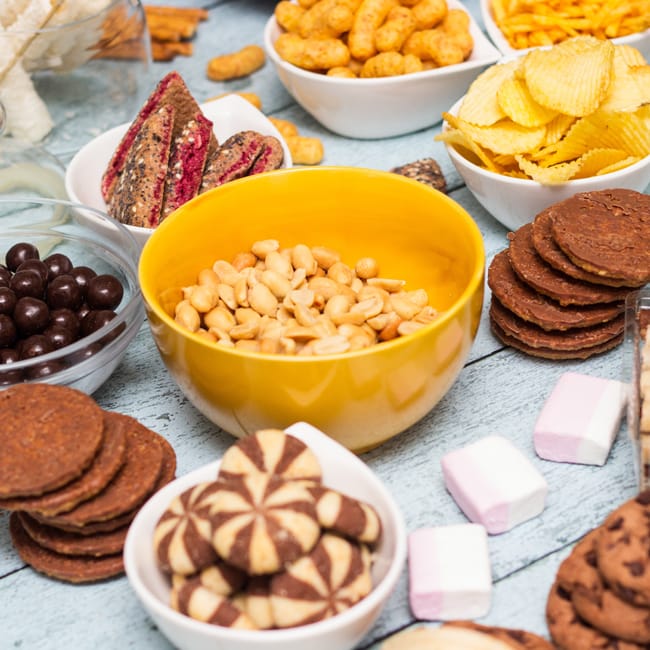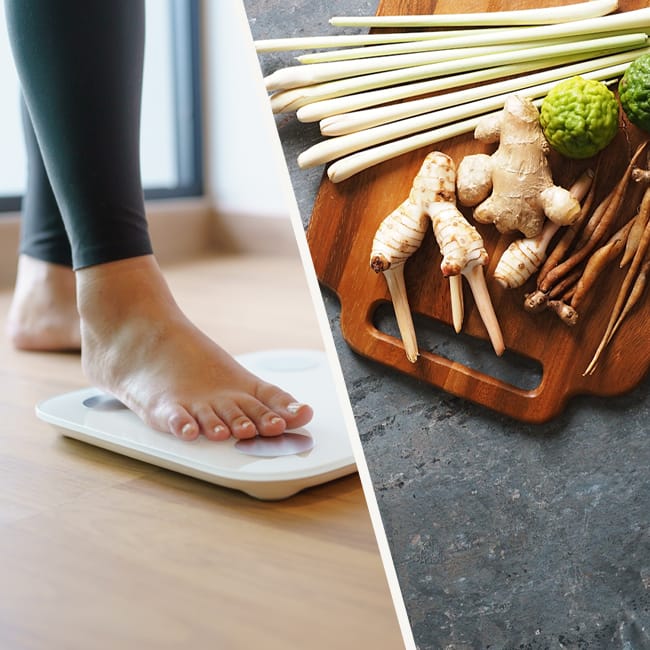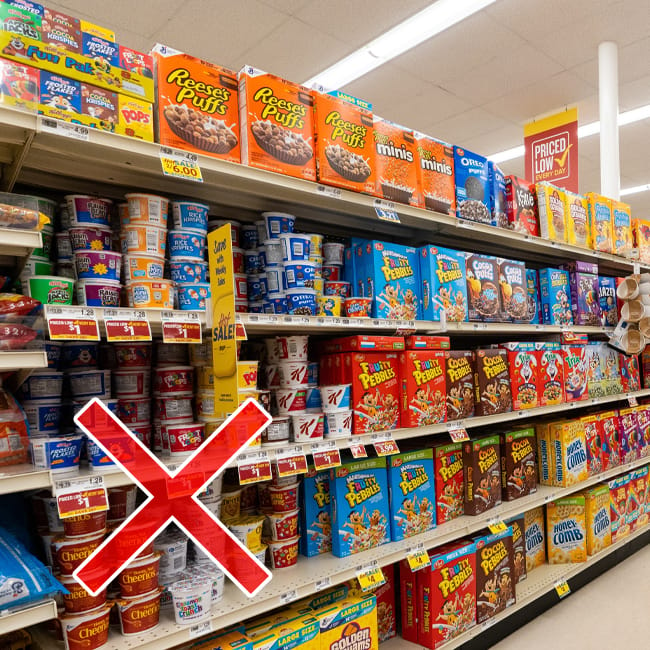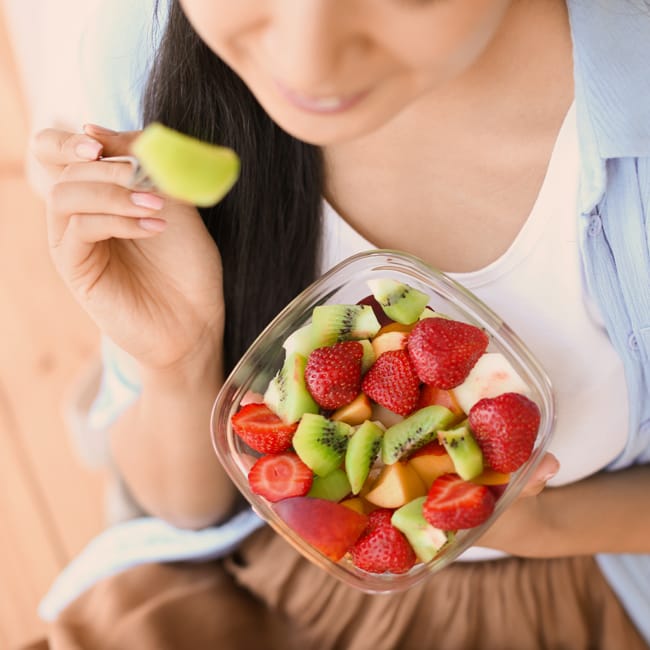Although diet alone cannot fully prevent cancer, certain foods can raise your chances of getting the disease. Consuming a diet rich in fat and low in fiber may heighten the risk of various cancers, such as those affecting the bowel, lungs, prostate, and uterus.
In an enlightening TikTok video, cancer dietitian and health expert Nichole (@oncology.nutrition.rd) revealed ten items she avoids consuming to help reduce her cancer risk and to support a healthier, more robust body. “Hi, my name is Nicole. I’m a cancer dietitian. I’m going to tell you 10 things that I do not eat or drink, as it does not help with a cancer prevention lifestyle,” she said at the beginning of the clip.


10 Items To Avoid To Lower Your Cancer Risk, According To An Oncology Dietitian
1. Alcohol
Nichole stressed: "Number one is I do not consume any alcohol." She noted that this includes "all types of alcohol, including red wine." This, she said, "is going to increase your risk of six different cancers." It's the "ethanol within the alcohol that so many people are encouraging," she went on.
"I see it all the time. To have alcohol, to destress, to cope with emotion, to have fun. But really, any consumption of alcohol, any, is just immediately starting to increase your risk of cancer." The dietitian also shared: "So I don't drink alcohol. Take it out."

2. Pepperoni Pizza
She said she does not "order a pepperoni pizza" since "processed meats increase colorectal cancer risk." She continued: "Here's the deal with alcohol and processed meats—they are the only two foods that increase risk of cancer at any consumption." Nichole went on to say that this includes "pepperoni, hot dogs, deli meats, precooked meats," and more. "Any consumption of that is going to be increasing your risk of cancer," she warned.
Rather than pepperoni pizza, Nichole noted that she will get "cheese" or she'll "do vegetarian, I'll do chicken, or I'll even get raw sausage from the store, cook that, and then I'll make a homemade pizza and put that on top of that." In addition, she explained: "So mostly chicken, mostly veggie, no pepperoni."

3. Processed Deli Meats
The dietitian then expanded on her point about processed meats. "I do not have the deli meats on my sandwiches. What I love to do is just simply cook chicken breasts, just plain in the oven," she said.
Nichole added: "You can always add spices and herbs to it, cook it, you know, slice it up, put in the refrigerator." She also noted that it's "good for several days to make sandwiches and wraps," and "super easy" without ever using a "processed meat" like those she talked about above.

4. Sugary Sodas
The health pro also warned against "sugary beverages" like sodas and energy drinks when it comes to cancer risk and prevention. "I do not order sugary beverages when I go out to eat," she said in the video, adding that she is always "making sure to keep" her "body fat tissue down." Nichole also noted that she aims to balance "a healthy level of calories." She continued: "I don't want my calories coming from all these beverages that are very high in calories, such as sodas." If "you go to a meal out and you have a large soda," this is going to add "a ton of extra calories."
The dietitian also said that those "mini cans" of soda is a better idea if you must drink it. "When I go out to eat, I'm going to have water or an unsweetened iced tea," she advised. Nichole also said that she will sweeten her iced tea with "artificial sweeteners that are safe and don't increase cancer risk," if she really wants to. Diet sodas, she stressed "don't increase risk of cancer" necessarily, but "the American Institute for Cancer Research recommends to not have a high level of sugary beverages," she said. This "can lead to excess calories, which then can lead to excess body fat tissue, which then increases risk of 13 different cancers."

5. Hot Dogs
Next thing up is "I do not do hot dogs during the summer," Nichole said. "Some of you might be like, man, how can you not do hot dogs during the summer? It's the barbecue grilling time," she acknowledged. However, the dietitian stressed that she will "have raw sausages that are not preserved." They "don't have preservatives, it's just raw sausage, that's it," she emphasized. "I'll grill that. The other thing that you want to keep in mind is when grilling, when the flames hit meats, it creates two carcinogenic byproducts, polycyclic aromatic hydrocarbons and heterocyclic amines."
She continued: "When you grill, it's best to pan fry your meats first, like your sausages, and then you can finish them on the grill." Another option is that "if you're having them on a grill, don't have the flames touch them and just reduce that cook time." The expert said that you "can even bake your sausages" and "use a whole wheat bun because whole grains help to reduce risk of cancer."

6. Red Meat
"When I go out to eat, I try not to order too much red meat," Nichole said. "Red meat is not going to increase risk of cancer at consumption like alcohol and processed meats do, however, red meats will increase risk of colorectal cancer after 18 ounces a week."
With that said, the dietitian will "usually keep to about just one serving of red meat a week, or I just don't have any at all." When she is going out to eat or cooking at home, the expert said she'll build her meals around "chicken, turkey, fish, seafood, or even, different types of plant proteins like soy and things like that." She wanted viewers to remember that "18 ounces of red meat per week is okay, but beyond that, then you're increasing risk of colorectal cancer."

7. Sugary Coffee Drinks
Many of us need coffee to start our day, but the worst kind you can choose for your health is one with loads of sugar. When you make coffee yourself at home, you can choose to sweeten it with a natural, healthy sweetener like monk fruit, or add a splash of a non-fat creamer, for example. "I don't order the largest size, the full sugar coffee drinks," Nichole said, noting that she loves coffee. "Coffee does not increase cancer risk. In fact, a lot of people think that it does, and it does not. It's a safe choice. I do like a cold coffee," she shared. She also opts for a "blended coffee throughout the summer."
However, she noted, "those can get so high in calories so fast." She continued: "what I do is with the sugary coffees, is I make sure I either get a kid size. I also make sure to get, half sweet, so, you know, whatever sugars things are adding to it, I'm having half the serving." The dietitian also asks for "sugar-free sweeteners" to bring "down the calories." Sugary coffees can "easily, easily get to 800 calories," she warned. "If you currently have those right now, and you have goals for weight loss, you want to reduce fat tissue to reduce risk of cancer." In addition, she suggests "that you go to the app or online to whatever coffee place that you love and really figure out the calories in your drinks and figure out ways to reduce the sugar." It's vital to choose "smaller sizes and less sugar," she pointed out.

8. White Grains
The expert explained that she'll never choose "any type of white grains" as she is a "whole grain girl through and through." Whole grains can "help you reduce risk of colon and breast cancer" as they "give you more fiber, and more nutrients as well," she said." More fiber is going to help you reduce risk of cancer, help you have better digestion, and help keep you feeling full."
In order to do that, Nichole will eat "brown rice, whole grain pasta, whole grain bread, bagels, English muffins, tortillas and hot dog buns. "I always do whole grain. I don't do the white breads," she repeated. "The white breads are not increasing your risk for cancer, and they're not a terrible choice. I'm just saying, I don't choose those because I want whole grain." She chooses them because they have "more fiber, which is going to help with cancer prevention and will have more nutrients," she went on.

9. Plant Milks
"I don't do the plant milks, okay? I always go for cow's milk. I always do dairy. Dairy is so nutrient-packed," Nichole explained. She noted that milk substitutes and dairy alternatives are "awesome if you have that allergy," but if not, drinks like "soy and almond milk" are "so low on protein."
She noted: "Are those safe choices? Absolutely, yes, all of them are safe choices. Okay? And if you like them, I want you to continue to enjoy them. But I'm just saying, for me, I don't choose those milk alternatives because of the low protein content, and milk is just so much more nutrient-dense." In addition, the dietitian shared that cow's milk has "amazing calcium that "reduces risk of colorectal cancer." With that said, she explained that "any consumption of dairy will reduce your risk of colon cancer."

10. Sugar Packets
In the video, Nichole emphasized the significance of avoiding sugar packets for sweetening your coffee, iced tea, or other drinks, highlighting that there are healthier and safer options not associated with cancer. "I don't add sugar to my zero calorie, no sugar beverages," she said.
@oncology.nutrition.rd Say goodbye to confusion and uncertainty. Join my 1:1 coaching program today, regain control over your diet, and get back to living your life to the fullest! LINK IN BIO TO APPLY for 1:1 support TODAY! #breastcancerjourney #lungcancerawareness #bravetheshave #lymphomaawareness #livercancer #kidneycancer #prostatecancerawareness #radiationtherapy #hormonetherapy #sarcomaawareness #cancerresearchUK #pancreaticcancer #lymphoma #ovariancancer #prostatecancer #cancerfree#cancerwarrior#cancerfighter #oncology #breastcancersurvivor #cancerresearch #chemotherapy #chemo #cancerpatient#cancerawarenessmonth #oncologynurses#cancercure#cancernation #breastcancercare #cancermotivation ♬ original sound - Nichole | Oncology Dietitian
The Bottom Line
She insisted: "I'm going to be using artificial sweeteners." Any artificial sweetener "you want is going to be safe," she highlighted, noting that she uses "whatever the store has on hand."
Artificial sweeteners are designed to "give you a lot more sweetness," and you don't "have to use so many packets." Nichole also said that they don't contain "extra calories" and they "sweeten your beverages" while not increasing "risk of cancer."


























